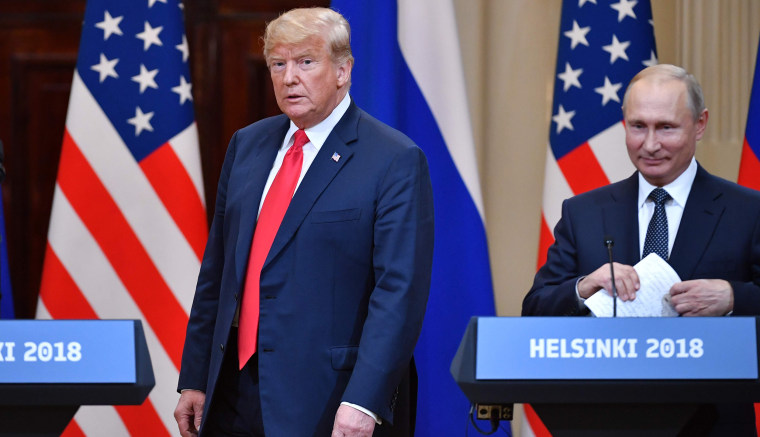A couple of weeks ago, with just 100 days remaining before Election Day 2020, William Evanina, the director of the National Counterintelligence and Security Center, released a statement on possible foreign interference in U.S. elections. The statement was vague, woefully short on details, and raised more questions than it answered.
Democrats on the Gang of Eight soon after responded with a statement of their own, describing Evanina warnings as "so generic as to be almost meaningless."
Late last week, the counterintelligence director gave it another try -- and the result was far more interesting.
Kremlin-linked operatives are trying to boost President Donald Trump's candidacy while China wants to see him defeated, the top U.S. counterintelligence official said Friday in a strikingly detailed update on American intelligence assessments about foreign preferences in the upcoming presidential election.... Evanina said the Russians, in a reprise of the 2016 presidential election, were once again trying to help Trump by sabotaging his opponent.
The full, unclassified statement from the NCSC director is online here, and it's worth reading in its entirely. The whole thing is only about 800 words -- roughly the length of the blog post you're reading now -- and it sheds a surprising amount of light on an ongoing foreign threat to our political system.
Some of the weekend coverage of the report highlighted an angle to the report that the White House was sure to like: one foreign power appears eager to see Trump win (Russia), while other foreign powers are equally eager to see Trump lose (China and Iran). This might give some of the public the impression that are multiple foreign rivals interested in our 2020 elections, with some vague sense of balance between them.
That's a takeaway the president can probably live with. Indeed, it's likely officials in the Office of the Director of National Intelligence packaged the latest findings this way precisely to avoid another Trump tantrum.
But the details matter. Countries like China and Iran may very well be keeping a close eye on our elections; and it's very easy to believe they'd like to see a change in direction at the White House. The findings from the National Counterintelligence and Security Center, however, didn't point to China and Iran actually doing anything to interfere in our electoral system. Indeed, their involvement in American politics appears to be limited to routine and public criticisms, such as denouncing the failures of the White House's response to the coronavirus crisis.
Or put another way, China and Iran would probably like to see Trump lose, but there's little to suggest they're taking devious steps to help produce that preferred result.
On the other hand, there's Russia, which, according to Evanina, is "using a range of measures" to undermine Joe Biden in order to help boost Trump's election prospects. This, of course, comes four years after Moscow also used a range of measures to help put Trump in power.
The distinction couldn't be more important: countries like China and Iran may want Trump to lose, but Russia is actively involved in an overt and deliberate campaign to make sure Trump doesn't lose.
And what might Moscow's "measures" include? Evanina's statement read, "For example, pro-Russia Ukrainian parliamentarian Andriy Derkach is spreading claims about corruption ... to undermine former Vice President Biden's candidacy and the Democratic Party."
If Andriy Derkach's name sounds at all familiar, it's probably because he's partnered with Rudy Giuliani, Trump's personal lawyer, and claims to have fed information to Sen. Ron Johnson (R-Wis.), the latter of whom is helping lead an anti-Biden effort in the Senate ahead of this year's elections.
"My question is: What are Democrats afraid of in my investigation?" the Wisconsin Republican asked in an interview last weekend with the ABC affiliate in Milwaukee. The question need not be rhetorical: what Democrats appear to be afraid of is Johnson being used to launder Kremlin-backed intel as Russia once again takes steps to help Trump.
We are, in other words, seeing a replay of 2016 -- with Moscow eager to boost the Republican ticket -- except this time, the Kremlin and it compatriots may be, among other things, using congressional allies of the White House as vessels for Russian propaganda.
For his part, a reporter asked Donald Trump over the weekend if he believes Russia is trying to hurt Biden's candidacy. The American president said that may be what Moscow wants, but he added, "I think that the last person Russia wants to see in office is Donald Trump."
Reminded that his own administration's intelligence points in the opposite direction, Trump added, "Well, I don't care what anybody says."
In context, he seemed to be referring to Evanina, his own hand-picked director of the National Counterintelligence and Security Center.

